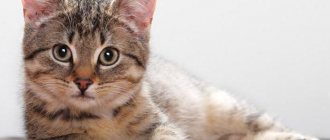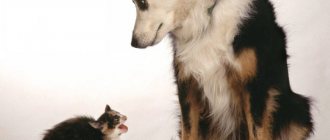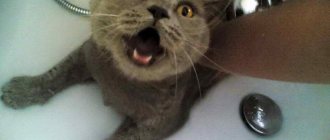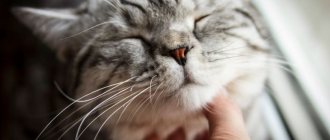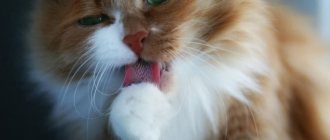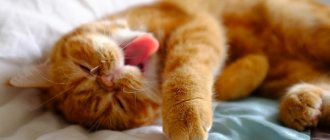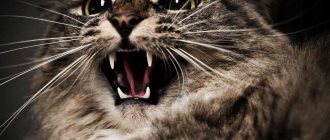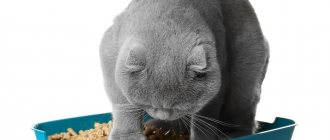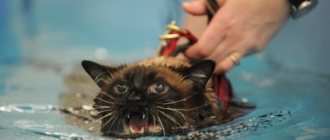Why does a cat yawn when he sees his owner?
- The average cat yawns once an hour.
- Most often after sleep and after stretching.
- But also at the sight of the owner.
- Is this a sign of disapproval?
When a cat yawns at you, it's easy to think that Her Majesty is just annoying you. Among people, such behavior is tactless, even rude. The “yawning” mouth should be carefully hidden so that the person nearby does not accidentally find out that you are bored. In the cat world, this behavior means something completely different. Cats yawn at their owners for many reasons. Get to know them all!
Energy storage
Yawning is, in fact, a complex bodily activity, the causes of which have not yet been established. One of them is the need for oxygenation (oxygen saturation). The blood becomes more saturated with oxygen and circulates faster, blood pressure rises and the number of heartbeats increases. The brain works better. It is a breath of energy for the body, a healthy and natural stimulation of action. In hypoxic blood, the concentration of carbon dioxide increases - so we can say that yawning protects against poisoning.
Cats use a similar yawn. They yawn for your well-being and so that they don't want to take another nap and spend some time with you doing activities and games.
Why is yawning contagious?
Not only humans, animals can also catch a yawn. There are many theories as to why this is the case.
- One of them says that this is a consequence of the fear of having enough air in the environment to breathe. When a person or animal sees someone yawning, they worry that the air is thin. The brain reacts immediately and takes in extra oxygen just in case.
- Another theory is imitation, which is inherent in all learning organisms.
Natural and forced yawning
Yawning is an involuntary action. The cat does not control the process. She yawns when the body needs to enrich the brain with oxygen.
The reason for yawning is lack of oxygen. You need to understand why your pet is yawning, and whether this is a sign of illness.
Natural causes
There are a number of natural reasons why four-legged animals yawn. These include :
- Yawning after sleep (discussed above).
- Stressful situations. During times of stress, a portion of adrenaline and hormones are released into the blood, putting the body on “combat readiness.” In this case, more energy is expended and oxygen reserves need to be replenished to maintain brain function. The animal yawns. A similar situation can be observed when the cat is, for example, at the veterinarian or in the car.
- Yawning after eating. Food that enters the body begins to be digested, and nutrients enter the blood and are distributed throughout the body, nourishing tissues and organs. To increase the speed of blood flow, the same oxygen is required, and the cat begins to yawn.
- It has been noticed that sometimes a cat yawns while looking at its owner when he yawns. The imitative reflex is triggered when everyone around begins to yawn.
© shutterstock
Why does a cat yawn often?
A cat often yawns when it sees a person. However, try not to take it personally. The cat is not bored with you and this is not a gesture of hostility. Against! Only calm, well-adjusted cats who don't need to worry yawn casually. If they do this in your presence, take it as a compliment. You give your cat stability and security. This is one of the most important things you can give your pet besides delicious food.
Cats often greet us with yawns. When we get home, the pet seems to want to say “hi” to us, but at the same time seems sleepy and bored. Cats sleep most of the time when we are not at home. They only wake up when we return. And after you take a nap, you urgently need to show yourself to the world...
This is also proof that the cat is happy and he is glad that we are already here. He is glad to see us. Now he hopes for interaction.
Everyday Reasons for Frequent Yawning
Cats, like humans and other animals, behave in a similar way and begin to yawn under certain conditions:
- Stuffiness in the room . Increased humidity, temperature and lack of oxygen cause yawning to provide additional air.
- Confusion of the animal . In this state, a good yawn helps you quickly make a decision for further action. Again, this is due to the increase in oxygen concentration in the animal's blood and brain.
- Boredom . Against the background of this state, drowsiness increases, and yawning becomes the expected result of a lack of entertainment.
- The period after eating . For complete digestion, the body redistributes blood, resulting in most of it accumulating in the digestive system. Blood circulation in the brain decreases. Yawning helps compensate for oxygen deficiency.
- Physical fatigue. Yawning in this case means going to bed soon. A long rest will compensate for the loss of strength in the future, and the pet will wake up cheerful and active.
As you can see, yawning is not something inexplicable. All physiological processes in the body have a clear sequence and mechanisms to compensate for the listed conditions.
Owner's actions. In order for the pet to feel good, the owner must follow the recommendations of specialists:
- First of all, you need to let your cat sleep as much as she wants. You cannot intentionally wake a cat, even if it keeps you awake at night. There are more humane ways to solve this problem.
- During the daytime, you should pay more attention to your pet and play active games with it. This will not only allow the animal to release all excess energy, but will also strengthen the bond with the owner.
Whatever the innate instincts and habits of the mustachioed tabby, exercise during the day will ensure healthy and sound sleep at night.
Is yawning a sign of a health problem?
Most cat yawns are a natural part of the body's functioning or an attempt at communication. As with any behavior, if something happens too often and is not adaptive, it may indicate health problems. There are three possible explanations for an excessively yawning cat:
- Dental problems. When a cat yawns frequently, she may feel a toothache. Additional symptoms include drooling, bad breath, red gums and feeding problems. Intervention by a feline dentist will be necessary.
- Dyspnea. When your cat is breathing at an accelerated rate, panting heavily, making strange sounds while breathing, do not delay your visit to the veterinarian
- Hypercapnia . This is a condition in which there is too much carbon dioxide in the body. The still yawning cat is trying to remove the CO2 and replace it with oxygen. You may need urgent treatment.
Stressful situations
Under the influence of factors that frighten a cat, significant amounts of hormones are released into the blood, bringing the body into full readiness to fight difficulties. Such situations can often be observed when visiting a veterinarian, for example, or while traveling in a vehicle with an animal previously unfamiliar with open spaces.
In addition to yawning, cats sometimes begin to breathe with their mouths open, which does not occur under normal conditions. This indicates a special degree of stressful tension and enormous fear.
If possible, all necessary manipulations should be performed with maximum speed in order to minimize the total duration of the pet’s state of shock.
How often does a cat yawn?
- The average cat yawns once every hour.
- Definitely after sleep and stretching.
- When this happens much more often, it is worth carefully examining the cat.
If your cat yawns at the sight of you, it is most likely showing happiness in your presence. The cat is relieved to feel at home and communicates that he feels safe with you. However, keep an eye on your cat's behavior. Any behavior that deviates from the norm should attract our attention. If your cat spends more time yawning than she should, have her checked by a veterinarian.
See also: Why do cats sleep a lot?
Physiology and psychology of cats - features
How do you feel if you yawn in a crowded place? Some people don’t care, what’s the big deal, some are embarrassed, but cats feel superior. Yes, by yawning and confident gait, four-legged animals demonstrate who is in charge in the territory , showing their strength and readiness to use it.
If you've watched films about wildlife, you've probably seen a lion basking in the sun, contemplating the pride and yawning widely. Perhaps it’s a matter of falling drowsiness, but more often than not, the behavior of the king of beasts indicates to his subordinates their status.
Note! When a cat yawns, it shows off its teeth and muscle mass.
Many people who observe their feelings confirm that after yawning, consciousness clears, the quality of well-being improves, there is a feeling of lightness and a decrease in stress levels. Yawning is especially important in a stressful situation, when the body works hard, a person yawns without even noticing it.
And it happens that after a serious quarrel or conflict, one of the participants begins to feel sleepy, a depressed state sets in, and appetite disappears - all these are the consequences of oxygen starvation. The body had a hard time because it lacked oxygen, and the person, “spurred on” by adrenaline, screamed (actively consumed oxygen) and did not yawn.
In a dream, the cat’s body is at rest, the immune system is working at full strength, but all organs are “resting.” Against the background of relaxation, blood flow in the animal’s body weakens and the oxygen content in the blood decreases. After waking up, the cat yawns and stretches to quickly get into shape and saturate its body with oxygen . The cat performs similar actions reflexively every time an oxygen deficiency is created.
This is interesting! The process of yawning is inherent in all living beings, even fish.
When a cat yawns, he is preparing for physical activity. Most cats hunt by waiting for prey and making a dash, and the games of four-legged animals are always somewhat reminiscent of hunting. During a jerk, the duration and speed of running depends only on the animal’s heart muscle; more precisely, a cat will not be able to run faster or longer if the heart does not provide the brain with oxygen. Yawning before the jerk, the tailed one seems to feed the blood with oxygen for its rapid, sharp and voluminous consumption.
Note! During stretching and yawning, the muscles are actively saturated with oxygen.
Yawning in the evening, according to the owner, indicates that the cat wants to sleep, but often this cliché is not true. All cats, even those born and raised in an apartment, are active at night and quieter during the day - this is an instinct. Even if your pet has adjusted to your rhythm of life, he will yawn in the evening and most often not in anticipation of sleep, but to warm up before any activity.
Yawn to cheer yourself up
If a person yawns, it means he wants to sleep or is bored. Many people believe that the cause of yawning may be due to a lack of oxygen in the room. But it is not so.
Yes, yawning can be associated with fatigue or sleepiness. When a person is emotionally or physically exhausted, their breathing begins to slow down. Inhalations and exhalations become less frequent and shorter, as a result of which, due to an excess of carbon dioxide in the blood, carbonic acid begins to predominate. This is what provokes yawning.
To get the missing dose of oxygen, you need a deep, slow breath. This is why the body begins to yawn. The muscles of the face and neck are actively involved in this process, due to the tension of which the blood flow of blood vessels and brain cells improves.
Many people want to stretch after yawning. This reflexive “charging” in tandem with yawning helps to awaken the body and improves dysfunctional functions.
Scientists have refuted the view that yawning is associated with a lack of oxygen in poorly ventilated areas. Experiments have shown that people yawn with the same frequency both when there is a lack of oxygen and when it is actively entering the body.
Controlling brain overheating
According to American researchers, yawning plays a critical role in regulating brain temperature. Like a computer, our brain can “overheat and fail” after prolonged activity. By yawning, we open up access to cooler air and new blood flow. As a result, our brain “reboots” and functional activity is restored.
Surprisingly, yawning prompts decisive action. During tense situations, our body seems to freeze, and breathing spontaneously stops for a while. And this is where yawning comes to the rescue. Saturating brain cells with oxygen improves readiness for responsible decisions.
Recommendations for owners to get rid of cat yawning
An attentive owner will always notice that something wrong is going on with the cat. If yawning is constant and accompanied by other symptoms, then it is necessary to urgently consult a specialist and begin treatment as soon as possible if health abnormalities are detected.
In all other cases, it is enough to provide the animal with a calm and measured life, devoid of stress and harsh environmental influences. The owner needs to ensure that the pet has enough time to sleep. You should not wake the cat. This is not a problem if there are no small children or other animals in the house. In other cases, you need to take care of arranging a secluded sleeping place.
The cat should receive a balanced premium diet, but if the animal eats natural food, then do not forget about additional vitamins. It is advisable to try to eliminate stress associated with travel as much as possible: the cat does not like a change of environment.
A cat is a very active animal and needs movement. An animal that does not have sufficient mobility begins to suffer from oxygen starvation. Therefore, it is important to pay attention to your pet, regularly involve it in outdoor games, and provide it with toys.
During outdoor games, the animal’s body is supplied with oxygen, which means that a situation of oxygen starvation will not arise
Yawning in a cat is rarely a sign of pathology. Usually this is a completely physiological process. But if you already have a pet in the house, you need to monitor and care for it. Only a loving owner can subtly notice the mood and well-being of a cat. Caring is the fundamental aspect of the relationship between a person and a cat.
Photos of yawning animals decorate more than one desktop on computers around the world. GIF animation of the cat yawns collects thousands of views. Perhaps every person has seen a cat yawn at least once in his life. At the same time, the animal opens its mouth wide, closes its eyes and freezes for a moment. When the brain lacks oxygen, a person yawns to compensate for the deficiency. What is the basis of yawning in cats?
